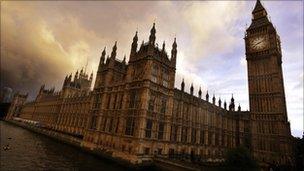NICVA fears welfare reform will hit poor hardest
- Published

The bill is currently passing through Westminster
The body which represents the voluntary sector has warned that the government's welfare reform bill will take £500m a year out of the NI economy.
The Welfare Reform Bill is due to be debated in the assembly this month.
It is described as the most radical shake up of the social security system in 40 years.
The NI Council for Voluntary Action (NICVA) and the Law Centre are holding a joint conference in Belfast on Tuesday to discuss the planned changes.
The British government's Welfare Reform Bill passed through its final stage in the House of Lords on 1 March.
That bill applied to England, Scotland and Wales.
Secretary of State Owen Paterson will attend the conference at which representatives from the voluntary and community sectors will be able put questions to an invited panel.
Seamus McAleavey, chief executive of NICVA, said: "There is a real fear that the Welfare Reform Bill will have a negative impact on the people of Northern Ireland, and their lives.
"With the bill expected to be introduced into the Northern Ireland Assembly this month, this event was extremely timely in opening up the debate.
"The voluntary and community sector now has a better understanding of some of these changes, and we hope the prominent decision-makers fully comprehend the impacts on some of the poorest people in our society who will be hit hardest."
Parity
Changes to Disability Living Allowance (DLA) are expected to have the biggest impact on people in Northern Ireland.
BBC NI Westminster reporter Stephen Walker said the British government felt the payments had grown too large and the money could be better targeted.
"People of working age who get DLA will instead get a personal independence payment. The plan is from next year those who get DLA will be assessed to see if they qualify," he said.
"In Northern Ireland, one in 10 of our population are on DLA so you can get an indication as to why the government feel this is so important."
Les Allamby, director of Law Centre (NI) said: "This will be the most significant piece of welfare legislation for a generation. We will be doing some things differently to Britain as we have no Work Programme and will not be devolving the Social Fund or our rate rebate scheme to local authorities.
"It is important to look at how we can take an approach that meets the needs and circumstances of Northern Ireland and this conference gives us the opportunity to stimulate this debate in advance of the bill going to the assembly."
However, it is unlikely the Northern Ireland executive will make any wholesale changes to the reforms that have gone through Westminster.
"Under the rules of parity, the way welfare payments work, if changes come in at Westminster they are expected to be brought in here," said Stephen Walker.
"It is possible the executive could amend some of those plans, but, and this is a big but, if the executive chose to do things differently from Westminster, any additional costs would have to be paid for by the executive."
- Published1 March 2012
- Published8 February 2012
- Published13 December 2011
- Published8 September 2011